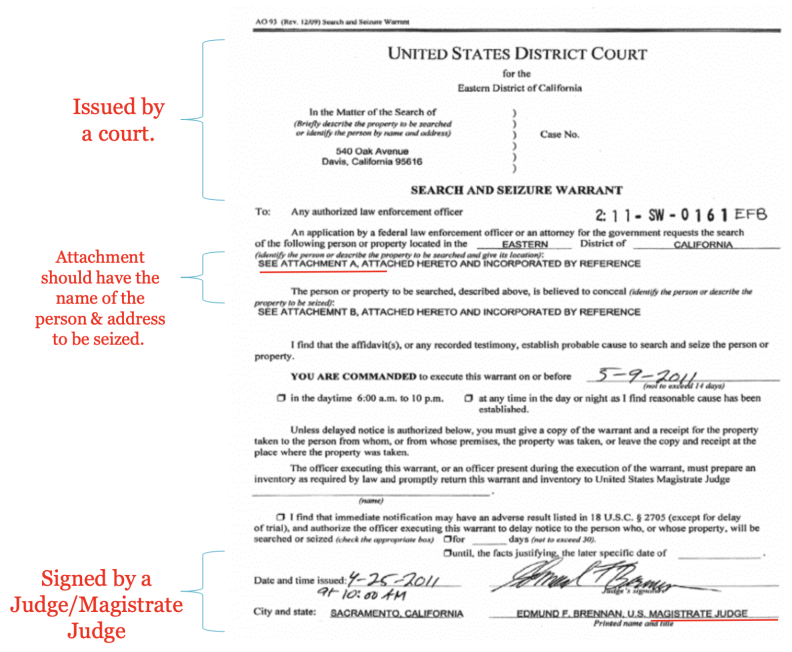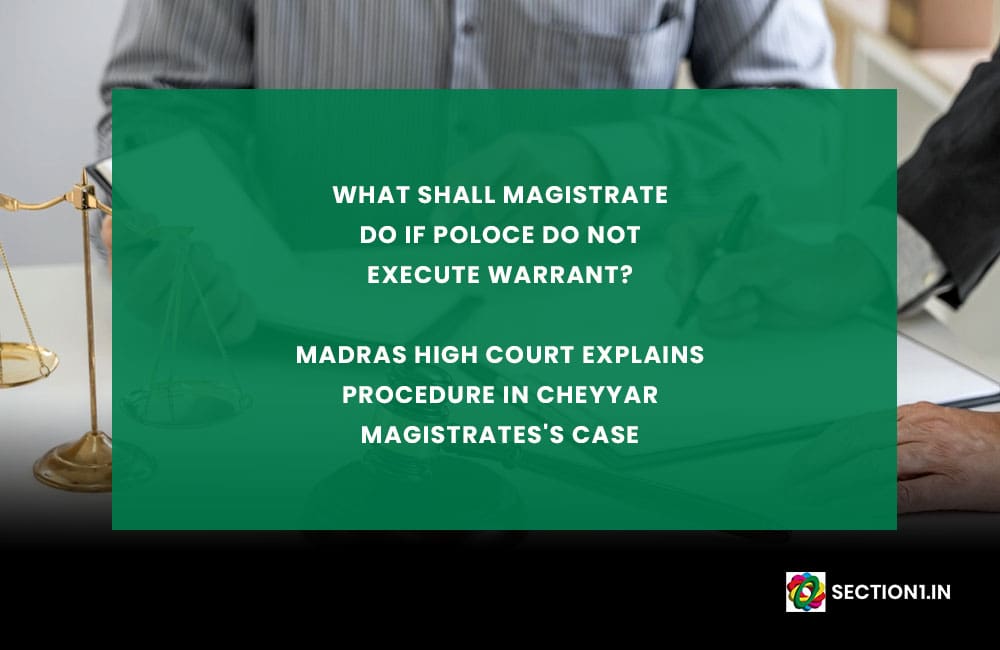Can A Magistrate Sign A Warrant - (a) a magistrate may issue a warrant of arrest or a summons: Rule 4(d) provides that a magistrate judge may issue an arrest warrant or summons based on information submitted electronically rather than. The authority to issue a straight warrant lies with judges or magistrates under the fourth amendment of the u.s. A warrant is a written court order signed by a judge or magistrate authorizing a police officer to conduct a search, seizure, or. As a magistrate, a municipal judge has authority to issue warrants of arrest for offenses including those that are outside of the municipal court’s. Evidence is presented in court and if the state. In any case in which he is by law authorized to order verbally the arrest of an. Magistrates only need probable cause to believe the allegations true in issuing the arrest warrant.
Evidence is presented in court and if the state. Magistrates only need probable cause to believe the allegations true in issuing the arrest warrant. In any case in which he is by law authorized to order verbally the arrest of an. (a) a magistrate may issue a warrant of arrest or a summons: Rule 4(d) provides that a magistrate judge may issue an arrest warrant or summons based on information submitted electronically rather than. As a magistrate, a municipal judge has authority to issue warrants of arrest for offenses including those that are outside of the municipal court’s. A warrant is a written court order signed by a judge or magistrate authorizing a police officer to conduct a search, seizure, or. The authority to issue a straight warrant lies with judges or magistrates under the fourth amendment of the u.s.
The authority to issue a straight warrant lies with judges or magistrates under the fourth amendment of the u.s. Evidence is presented in court and if the state. Magistrates only need probable cause to believe the allegations true in issuing the arrest warrant. In any case in which he is by law authorized to order verbally the arrest of an. Rule 4(d) provides that a magistrate judge may issue an arrest warrant or summons based on information submitted electronically rather than. A warrant is a written court order signed by a judge or magistrate authorizing a police officer to conduct a search, seizure, or. (a) a magistrate may issue a warrant of arrest or a summons: As a magistrate, a municipal judge has authority to issue warrants of arrest for offenses including those that are outside of the municipal court’s.
Magistrates' Blog An Introduction to Search Warrants
Evidence is presented in court and if the state. The authority to issue a straight warrant lies with judges or magistrates under the fourth amendment of the u.s. Magistrates only need probable cause to believe the allegations true in issuing the arrest warrant. A warrant is a written court order signed by a judge or magistrate authorizing a police officer.
How To Know If You Have An Arrest Warrant JudgeDumas
In any case in which he is by law authorized to order verbally the arrest of an. A warrant is a written court order signed by a judge or magistrate authorizing a police officer to conduct a search, seizure, or. Evidence is presented in court and if the state. Rule 4(d) provides that a magistrate judge may issue an arrest.
A Municipal Judge Does Have The Authority To Issue An Arrest
Evidence is presented in court and if the state. The authority to issue a straight warrant lies with judges or magistrates under the fourth amendment of the u.s. A warrant is a written court order signed by a judge or magistrate authorizing a police officer to conduct a search, seizure, or. Magistrates only need probable cause to believe the allegations.
Search Warrant YES U CAN Republic of the Philippines National
In any case in which he is by law authorized to order verbally the arrest of an. Magistrates only need probable cause to believe the allegations true in issuing the arrest warrant. Evidence is presented in court and if the state. Rule 4(d) provides that a magistrate judge may issue an arrest warrant or summons based on information submitted electronically.
Arrest Warrant and Role of Magistrate The Law Blog
In any case in which he is by law authorized to order verbally the arrest of an. A warrant is a written court order signed by a judge or magistrate authorizing a police officer to conduct a search, seizure, or. Magistrates only need probable cause to believe the allegations true in issuing the arrest warrant. The authority to issue a.
Know your rights
Evidence is presented in court and if the state. The authority to issue a straight warrant lies with judges or magistrates under the fourth amendment of the u.s. Rule 4(d) provides that a magistrate judge may issue an arrest warrant or summons based on information submitted electronically rather than. A warrant is a written court order signed by a judge.
What to Do If You Have an Arrest Warrant in California Shouse Law Group
A warrant is a written court order signed by a judge or magistrate authorizing a police officer to conduct a search, seizure, or. Evidence is presented in court and if the state. Rule 4(d) provides that a magistrate judge may issue an arrest warrant or summons based on information submitted electronically rather than. The authority to issue a straight warrant.
The Power of a Magistrate Understanding Their Authority
The authority to issue a straight warrant lies with judges or magistrates under the fourth amendment of the u.s. A warrant is a written court order signed by a judge or magistrate authorizing a police officer to conduct a search, seizure, or. Evidence is presented in court and if the state. Rule 4(d) provides that a magistrate judge may issue.
Can “Magistrate Judges” Constitutionally Sign Search Warrants? YouTube
Rule 4(d) provides that a magistrate judge may issue an arrest warrant or summons based on information submitted electronically rather than. In any case in which he is by law authorized to order verbally the arrest of an. The authority to issue a straight warrant lies with judges or magistrates under the fourth amendment of the u.s. A warrant is.
What Should I Do If The Police Call And Have An Arrest Warrant For Me?
Evidence is presented in court and if the state. The authority to issue a straight warrant lies with judges or magistrates under the fourth amendment of the u.s. As a magistrate, a municipal judge has authority to issue warrants of arrest for offenses including those that are outside of the municipal court’s. Magistrates only need probable cause to believe the.
As A Magistrate, A Municipal Judge Has Authority To Issue Warrants Of Arrest For Offenses Including Those That Are Outside Of The Municipal Court’s.
Rule 4(d) provides that a magistrate judge may issue an arrest warrant or summons based on information submitted electronically rather than. (a) a magistrate may issue a warrant of arrest or a summons: Evidence is presented in court and if the state. In any case in which he is by law authorized to order verbally the arrest of an.
A Warrant Is A Written Court Order Signed By A Judge Or Magistrate Authorizing A Police Officer To Conduct A Search, Seizure, Or.
The authority to issue a straight warrant lies with judges or magistrates under the fourth amendment of the u.s. Magistrates only need probable cause to believe the allegations true in issuing the arrest warrant.









